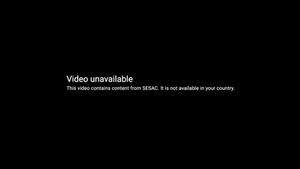Videos containing music by the likes of Bob Dylan, Adele, REM, Green Day and Burna Boy have been blocked on YouTube within the US after licensing talks between the video platform and American collecting society SESAC seemingly stalled.
YouTube says that its existing SESAC licence has now expired, necessitating the takedowns, though sources say that that licence actually expires this week and the takedowns are therefore premature, possibly as a negotiating tactic.
As users started to note the blocked music videos on social media this weekend, YouTube’s support team on Twitter responded, “our music licence agreement with SESAC has expired without an agreement on renewal conditions despite our best efforts. For this reason, we have blocked content on YouTube in the US known to be associated with SESAC - as in line with copyright law”.
A spokesperson for YouTube subsequently told reporters, “We have held good faith negotiations with SESAC to renew our existing deal. Unfortunately, despite our best efforts, we were unable to reach an equitable agreement before its expiration. We take copyright very seriously and as a result, content represented by SESAC is no longer available on YouTube in the US. We are in active conversations with SESAC and are hoping to reach a new deal as soon as possible”.
Sources told Variety that YouTube had actually started blocking videos containing SESAC licensed works a few days before its current licence expires. Given that the takedowns impact the official music videos of the songwriters SESAC represents - inconveniencing both the writers and their other business partners - the blocks might put pressure on SESAC to get a new licensing deal across the line.
Although YouTube’s users are also inconvenienced. Some of those complaining on social media this weekend were keen to point out that they are premium subscribers of YouTube and aren’t impressed that, as paying customers, they currently don’t have access to the official videos of some major hits.
It’s not clear quite how many videos will be impacted by the takedowns, given the complexities around music rights ownership, and also in identifying what songs appear, especially in videos uploaded from unofficial sources. Although YouTube’s rights management systems are among the best. In theory videos soundtracked by SESAC represented songs, as well official music videos, should probably be blocked or muted.
Platforms like YouTube, which stream videos containing music, need licences from the music industry covering both recordings and the songs contained in those recordings. Those licences also need to cover both the performing rights and the mechanical rights in songs, and grant permission for the music to be synchronised into videos. In some countries, and with some repertoire, the performing rights and the mechanical rights will be licensed separately.
In the US, the performing rights are commonly licensed by the five collecting societies that represent songwriters and music publishers: BMI, ASCAP, GMR and AllTrack, as well as SESAC.
SESAC is much smaller than BMI and ASCAP in terms of the writers and works it represents, though it nevertheless counts some prestigious writers among its membership which increases its negotiating power.
Whenever there are licensing disputes involving song rights, other artists and music companies not directly involved in the dispute are impacted. Record labels and music publishers that work with SESAC member writers will still see videos containing their music blocked, even though they have active licensing deals with YouTube. Plus artists who released recordings of songs co-written by SESAC member writers could also be impacted.
We’ve seen this before, of course. Most recently when Universal Music had its big bust up with TikTok, which impacted on some of its music publishing catalogue as well as its recordings. And German collecting society GEMA refused to license YouTube for many years, significantly impacting on how music was used on the video platform within Germany.
Usually a deal is ultimately agreed and any blocked or muted videos return, so presumably that will happen this time with the SESAC songs. Though we’ll see how long it takes for that to happen.

